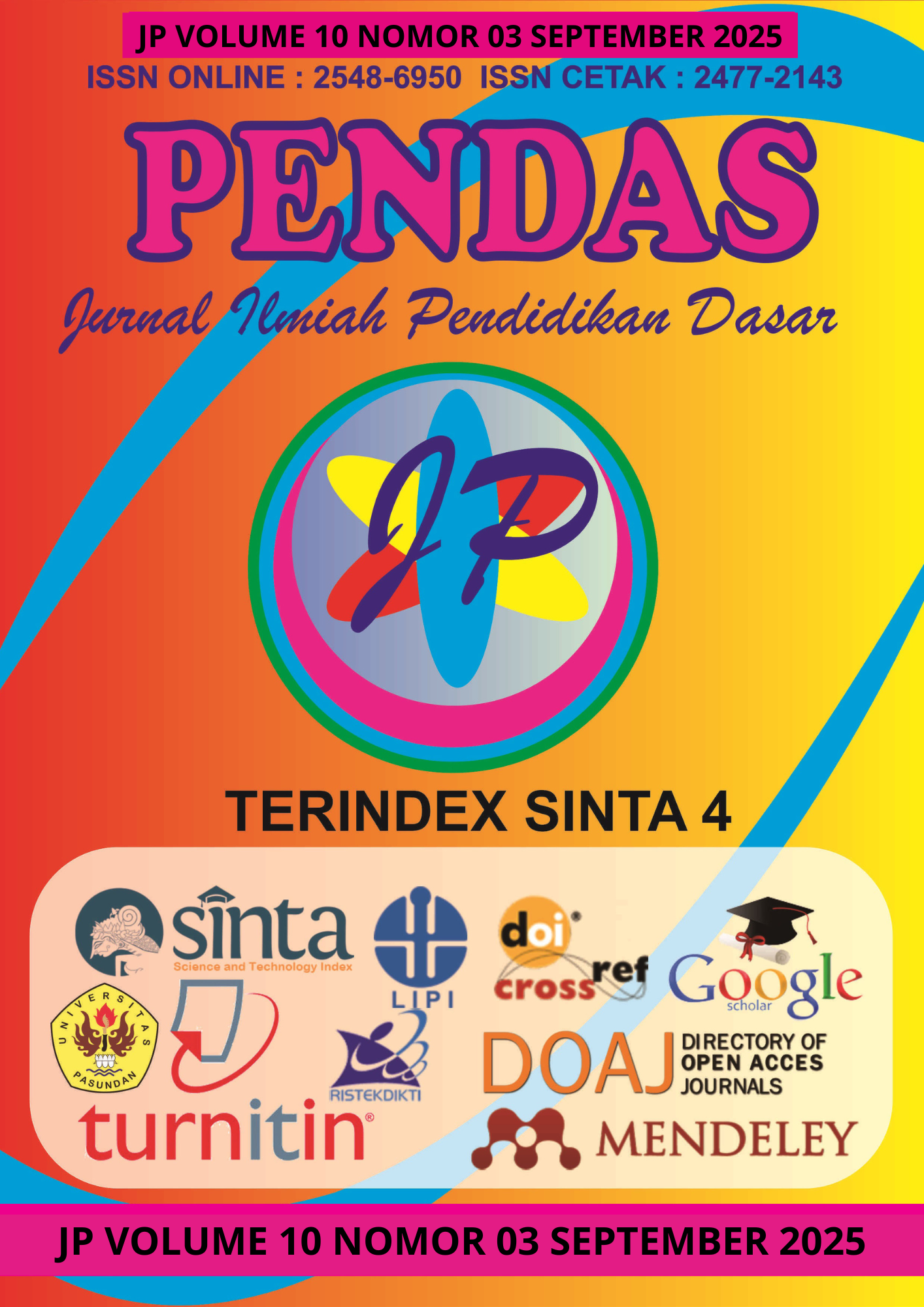EFEKTIVITAS MODEL KOOPERATIF TIPE TEAMS GAMES TOURNAMEN (TGT) DALAM MENINGKATKAN HASIL BELAJAR KOGNITIF SISWA KELAS XI SMAN 2 SAWAHLUNTO PADA MATA PELAJARAN GEOGRAFI
DOI:
https://doi.org/10.23969/jp.v10i03.30941Keywords:
Teams Games Tournament (TGT), Cognitive Learning Outcomes, Cooperative Model, Geography LearningAbstract
This study aims to determine the effectiveness of the Teams Games Tournament (TGT) cooperative learning model in improving students' cognitive learning outcomes in Geography for Grade XI at SMAN 2 Sawahlunto. The background of this study is the low cognitive learning outcomes of students caused by a lack of variety in learning models and low student engagement in the learning process. This study employs a quantitative approach using an experimental method and a pretest-posttest control group design. The research sample consists of two classes: XI.F4 as the experimental class and XI.F5 as the control class, with a total of 67 students. Data were collected through pretest and posttest assessments and analysed using descriptive statistical tests, normality tests, homogeneity tests, t-tests, and N-Gain tests. The results of the study indicate that the implementation of the TGT model significantly improves students' cognitive learning outcomes. The posttest average of the experimental class reached 86.94 with a completion rate of 91%, compared to the control class, which only reached an average of 70.42 with a completion rate of 7%. The N-Gain value of the experimental class was 0.72, which is classified as quite effective. Thus, the TGT cooperative learning model has been proven to be effective in improving students' cognitive learning outcomes in Geography.
Downloads
References
Ali, I. (2021). Pembelajaran Kooperatif Dalam Pengajaran Pendidikan Agama Islam. Jurnal Mubtadiin, 7(1), 247–264. http://journal.an-nur.ac.id/index.php/mubtadiin/article/view/82
Aulia, A. T., & Aji, A. (2024). Hubungan Antara Literasi Bukhari. (2022). Model Teams Games Tournament. 11, 18–26.
Gandari, P., & Syaban, M. B. A. (2024). Pengaruh Model Pembelajaran Kooperatif Teams Games Tournament (TGT) Berbantu Media Peta terhadap Hasil Belajar Materi Keragaman Hayati Kelas XI. JIIP - Jurnal Ilmiah Ilmu Pendidikan, 7(2), 1423–1428. https://doi.org/10.54371/jiip.v7i2.3467
Hakim, A. R., & Darojat, J. (2023). Pendidikan Multikultural dalam Membentuk Karakter dan Identitas Nasional. Jurnal Ilmiah Profesi Pendidikan, 8(3), 1337–1346. https://doi.org/10.29303/jipp.v8i3.1470
Hayati, S., & Saputra, L. A. (2023). Pengaruh Motivasi Kerja Terhadap Kinerja Karyawan Dengan Kepuasan Kerja Sebagai Variabel Intervening Pada Cv. Jaya Anugrah. Business Management, 2(1), 49–53. https://doi.org/10.58258/bisnis.v2i1.5430
Kaffah, W. D., Erlin, E., & Rusyana, A. (2023). Pengaruh Model Pembelajaran Project Based Learning Berbasis STEAM Terhadap Hasil Belajar Kognitif Siswa. J-KIP (Jurnal Keguruan Dan Ilmu Pendidikan), 4(3), 1–8. https://doi.org/10.25157/j-kip.v4i3.11413
Melda Salsabillah, Ahmad Sabandi, Nurhizrah Gistituati, H. A. K. (2020). Budaya Organisasi Sekolah Menengah Kejuruan Melda. Jurnal Environmental Science, 3(1), 29–34.
Nadrah, N. (2023). The Effectiveness Of The Teams Games Tournament (TGT) Cooperative Learning Model Application On Physics Learning Outcomes Of Students. International Journal of Educational Research & Social Sciences, 4(4), 648–656. https://doi.org/10.51601/ijersc.v4i4.678
Nurhayati, Egok, A. S., & Aswarliansyah. (2022). Penerapan Model Pembelajaran Kooperatif Tipe TGT pada Pembelajaran IPA Sekolah Dasar. Jurnal Basicedu, 6(5), 9118–9126. https://jbasic.org/index.php/basicedu%0APenerapan
Nurjanah. (2021). Analisis Kepuasan Konsumen dalam Meningkatkan Pelayanan Pada Usaha Laundry Bunda Nurjanah. Jurnal Mahasiswa, 1, h. 5.
Nurlindayani, E. (2021). Profil Hasil Belajar Kognitif Siswa Dengan Metode Blended Learning Pada Materi Sistem Pernapasan Manusia. 7, 55–62.
Risdiana Chandra Dhewy. (2022). Pelatihan Analisis Data Kuantitatif Untuk Penulisan Karya Ilmiah Mahasiswa. J-ABDI: Jurnal Pengabdian Kepada Masyarakat, 2(3), 4575–4578. https://doi.org/10.53625/jabdi.v2i3.3224
Subhaktiyasa, P. G. (2024). Menentukan Populasi dan Sampel : Pendekatan Metodologi Penelitian Kuantitatif dan Kualitatif. 9, 2721–2731.
Susanto, P. C., Arini, D. U., Yuntina, L., & Panatap, J. (2024). Konsep Penelitian Kuantitatif : Populasi , Sampel , dan Analisis Data ( Sebuah Tinjauan Pustaka ). 3(1), 1–12.
Syaadah, R., Ary, M. H. A. A., Silitonga, N., & Rangkuty, S. F. (2023). Pendidikan Formal, Pendidikan Non Formal Dan Pendidikan Informal. Pema (Jurnal Pendidikan Dan Pengabdian Kepada Masyarakat), 2(2), 125–131. https://doi.org/10.56832/pema.v2i2.298
Downloads
Published
Issue
Section
License
Copyright (c) 2025 Pendas : Jurnal Ilmiah Pendidikan Dasar

This work is licensed under a Creative Commons Attribution 4.0 International License.



















